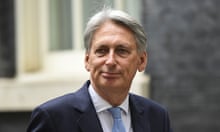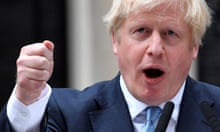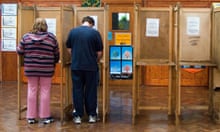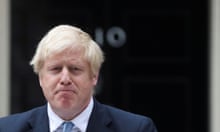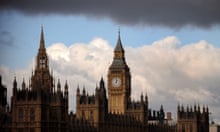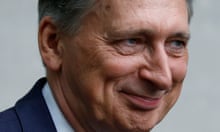Boris Johnson has issued a final Brexit ultimatum to rebel MPs by pledging to call a snap general election next month if the House of Commons pushes ahead with a bill tabled by a cross-party group of backbenchers seeking to block no deal.
In a carefully choreographed sequence, Johnson held an emergency cabinet meeting, addressed Conservative MPs at a Downing Street reception and then made a live television address outside No 10 to say there were “no circumstances” under which departure from the EU would not happen on 31 October.
Johnson said in his televised address, which was punctuated by chants from protestors at the gates of Downing Street, that he did not want an election. But No 10 briefings openly threatened one on 14 October if rebels did not back down.
Johnson said the backbench bill, signed by the former chancellor Philip Hammond, the ex-justice secretary David Gauke and others, would “chop the legs out” from the UK’s Brexit negotiations.
The bill, which the MPs hope to push through parliament at high speed if they seize control of the Commons timetable on Tuesday, would mandate Johnson to extend departure until 31 January, unless MPs backed a deal or approved no deal.
Downing Street spelled out the consequences for rebel Conservative MPs, already threatened with losing the party whip, if they pushed ahead with the plan and took over the Commons timetable.
A No 10 source said the vote on proceeding with the backbench bill would be seen as the equivalent of a confidence motion in the government. If it passed, the government would consider seeking a snap election on 14 October, using the 2011 Fixed-Term Parliaments Act (FTPA). This threat would then be withdrawn if the bill did not succeed.
“MPs are effectively considering tomorrow whether to hand control of the negotiations to Jeremy Corbyn,” the source said.
“That would be shooting ourselves in the foot and if Conservative MPs help him to make no deal illegal tomorrow, and therefore create another pointless delay, the government’s negotiating position will be wrecked. What they are effectively voting for is to hold a rapid election. And they will have to explain what they are doing.”
The Guardian understands the plan has been under consideration for a number of days but was “crystallised” by the seeming determination of MPs to press on with the legislation despite threats of deselection.
One source said they believed it could significantly limit the number of rebels. “Some MPs have clearly made up their minds but more than you would think are quietly considering if this is really how they want their political careers to end,” the source said. “You cannot get around that fact, that will be the consequence.”
Under the FTPA, the government can trigger an election if two-thirds of MPs support it. With Labour backing an election if it did not take place after 31 October, this would be expected to pass, with Downing Street bullish the election would be called.
Senior rebel Tories and Labour MPs are sceptical Johnson would stick to his word and call an election before 31 October, though government sources ruled out any chance of changing the date after MPs had voted.
“A prime minister would need to be in place before European council on 17 October,” the source said. “If you are to have any chance of securing a deal, you must have an election before then, and the prime minister has been very clear he wants to get a deal.”
Another Downing Street source said there was no serious consideration given to calling an election after 31 October – and they hoped MPs would take that as proof Johnson was intent on securing a deal.
“It is a very deliberate choice to call it before 31 October; this is his commitment to getting a deal, that should not be overlooked by MPs tomorrow who say they want to see that proof,” the source said.
A source close to the group of Conservative MPs opposed to no deal suggested the group was holding firm. “It’s a bit rich for the prime minister to point the finger at colleagues who plan to defy the party whip – colleagues who voted for a deal three times – while he voted with Jeremy Corbyn to inflict the two biggest parliamentary defeats on a government in British history,” the source said.
“The prime minister seems to be doing everything he can to bring about an election, while claiming it’s the last thing he wants.”
If an election is called for Monday 14 October it would be the first since 1931 not to be held on a Thursday. If Johnson loses it, he will become Britain’s shortest-serving prime minister.
In Johnson’s brief and occasionally halting public address outside the door of No 10, in parts almost drowned out by boos and chants of “Stop the coup” from protesters, he condemned the backbench plan, published shortly beforehand.
He said he was “encouraged by the progress we are making” in talks with Brussels on a new deal, but said moves by MPs to block no deal or extend Brexit would weaken the UK’s negotiating stance.
“If there is one thing that can hold us back in these talks it is the sense in Brussels that MPs may find some way to cancel the referendum,” he said, adding that he hoped this would not happen.
“But if they do, they will plainly chop the legs out from under the UK position and make any further negotiation absolutely impossible. I want everybody to know – there are no circumstances in which I will ask Brussels to delay. We are leaving on 31 October, no ifs or buts. We will not accept any attempt to go back on our promises or scrub that referendum.”
Claiming parliament would have time to scrutinise any deal, Johnson said that, in the interim, the UK’s negotiating team should be allowed to work “without that sword of Damocles over their necks, and without an election, which I don’t want and you don’t want”.
Shortly beforehand, the Labour MP Hilary Benn tabled the final version of the rebels’ bill aimed at stopping a no-deal Brexit, which would mandate Johnson to seek an extension for three months until 31 January.
The bill says an extension must be sought if the prime minister has not passed a new Brexit agreement by 19 October – the day after a key European council meeting – unless MPs have passed a motion approving a no-deal Brexit.
The bill states Johnson must otherwise write to the president of the European council requesting an extension is set out in a schedule to the bill. However, controversially, it also states Johnson must accept any alternative extension offered by the EU, though that must be put to a vote in parliament.
If both sides agree a deal after 19 October but before 31 January, Brexit could happen sooner but the bill also does not state what would then happen if there was still no agreement by the end of January.
Keir Starmer, the shadow Brexit secretary, said the bill would “stop Boris Johnson forcing through a reckless and damaging no deal Brexit” and urged MPs to back it.
Jeremy Corbyn, the Labour leader, who held a shadow cabinet meeting in Salford on Monday, said the party was “ready for a general election, which will be a once in a generation chance for a real change of direction for our country”.
The mood among Conservative MPs appears distinctly more mixed, with rebels led by Hammond and Gauke increasingly flexing their muscles. Hammond tweeted a letter he had written to Johnson seeking details on Johnson’s proposed changes to the withdrawal agreement. On Monday night Gauke confirmed to the Times that he would vote against the party whip.
Even some publicly loyal Tories said they had grave doubts about an election. “It’s fair to say I’m not energised by this,” one MP said. “Snap elections are a physically, emotionally and politically draining experience anyway, and this feels very risky for the party and divisive for the country.
“But I think Boris is very tempted. He might think it’ll be a silver bullet for all his problems – get rid of the rebels and win a majority. But it’s an unpredictable time, even for people in safe seats.”
A number of backbenchers did not attend the drinks reception at No 10, some still being out of London and others choosing not to. One backbench rebel said they did not want to spend an evening with “English nationalists”.
